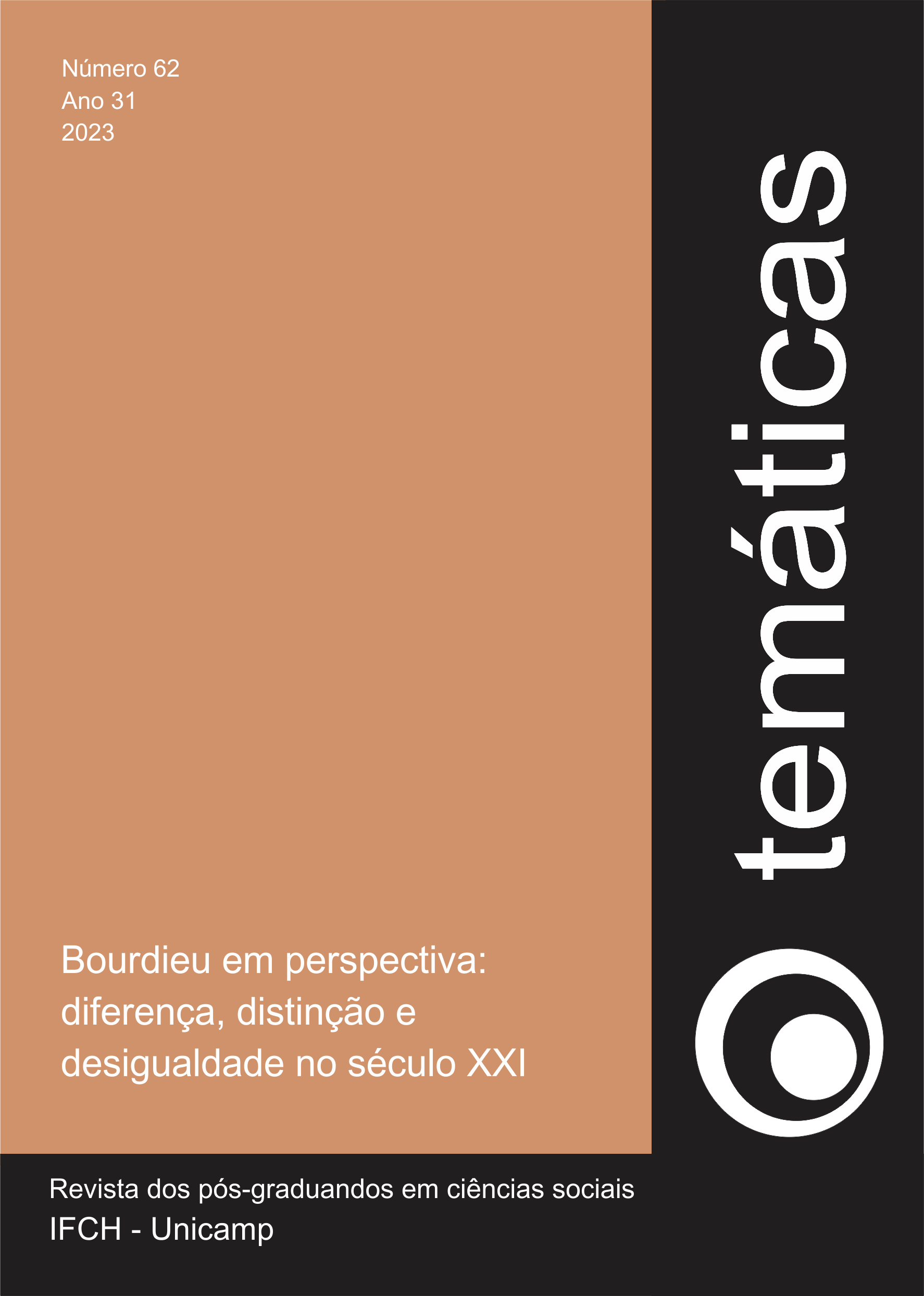Abstract
Aligned with studies on lifestyles and cultural distinction, in this text I analyze variations in cultural practices and tastes among women and men within the student population of the State University of Campinas. To do so, I use data from a survey on social stratification and lifestyles among the student population, carried out by applying questionnaires (sample of 548 students) and conducting in-depth interviews (22 students from different social backgrounds). Analyzing with a gender perspective data from three cultural domains (uses of time, musical preferences and literary preferences), I show that women present a pattern of practices and tastes that are homologous between the different domains, marked by the variety of practices, interests and tastes, while men have a lifestyle marked by a lower load of activities and aesthetic homogeneity. To explain these patterns, I offer three hypotheses based on the literature on cultural practices and gender inequalities. The first is that there is a gender bias in the accumulation of cultural capital, imposing greater work on women students so that they can reach the same positions as men. The second is that it is a cultural omnivorism oriented towards building a sense of belonging and accumulating social capital. The third is that there is a greater openness to the re-signification of female identity from the mobilization of diverse lifestyles in comparison with a more homogeneous lifestyle that marks the male identity.
References
BENNETT, Tony et al. Culture, class, distinction. London: Routledge/Taylor & Francis, 2010.
BOLTANSKI, Luc. Rendre la réalité inacceptable, à propos de "La production de l’idéologie dominante". Paris: Demopolis, 2008.
BOURDIEU, Pierre. O capital social - notas provisórias. In: BOURDIEU, Pierre. Escritos de educação. Organização de Maria Alice Nogueira, Afrânio Mendes Catani. 15.ed. Petrópolis, RJ: Vozes, 2007.
BOURDIEU, Pierre. Espaço social e espaço simbólico. In: BOURDIEU, Pierre. Razões práticas: sobre a teoria da ação. Campinas, SP: Papirus, 1996.
BOURDIEU, Pierre. A dominação masculina. Tradução de Maria Helena Kühner. 10. ed. Rio de Janeiro, RJ: Bertrand Brasil, 2011
BOURDIEU, Pierre. A distinção: crítica social do julgamento. 2. ed. rev. 4 reimpr. - São Paulo, SP; Porto Alegre, RS: Edusp: Zouk, 2017.
CASTRO, Bárbara; CHAGURI, Mariana Miggiolaro. Gênero, tempos de trabalho e pandemia: por uma política científica feminista. Linha Mestra, v. 14, n. 41a, p. 23-31, 2020.
CHILDRESS, Clayton et al. Genres, objects, and the contemporary expression of higher-status tastes. Sociological Science, v. 8, p. 230-264, 2021.
COLLINS, Randall. Mulheres e a produção de culturas de status. In: LAMONT, Michèle; FOURNIER, Marcel. Cultivando diferenças: fronteiras simbólicas e a formação da desigualdade. São Paulo: Sesc, 2015.
CORRÊA, Mariza. O sexo da dominação. Novos Estudos, n. 54, p. 43-53, 1999.
DIMAGGIO, Paul. Classification in art. American sociological review, p. 440-455, 1987.
GRANOVETTER, Mark. The strength of weak ties. American journal of sociology, v. 78, n. 6, p. 1360-1380, 1973.
HIRATA, Helena. Gênero, classe e raça Interseccionalidade e consubstancialidade das relações sociais. Tempo social, v. 26, p. 61-73, 2014.
HUPPATZ, Kate. Gender capital at work: Intersections of femininity, masculinity, class and occupation. Springer, 2012.
KERGOAT, Danièle. Divisão sexual do trabalho e relações sociais de sexo. In: HIRATA, Helena. Dicionário crítico do feminismo. São Paulo, SP: Editora UNESP, 2009.
LEIVA, João. Cultura SP: Hábitos culturais dos paulistas. São Paulo: Tuva Editora, 2014.
LEIVA, João; MEIRELLES, Ricardo. Cultura nas capitais: como 33 milhões de brasileiros consomem diversão e arte. Rio de Janeiro: 17Street Produção Editorial, 2018.
LIMA, Mariana Martinelli de Barros. A experiência dos não-herdeiros: relações entre herança simbólica e a cultura acadêmica. Dissertação (mestrado), Universidade Estatual de Campinas - Instituto de Filosofia e Ciências Humanas, Campinas, SP, 2020.
LIZARDO, Omar. How cultural tastes shape personal networks. American sociological review, v. 71, n. 5, p. 778-807, 2006.
MILLER, Diana. Symbolic capital and gender: Evidence from two cultural fields. Cultural Sociology, v. 8, n. 4, p. 462-482, 2014.
MILLER, Diana. Gender, field, and habitus: How gendered dispositions reproduce fields of cultural production. Sociological Forum, p. 330-353, 2016.
PAKULSKI, Jan. Fundamentos de uma análise pós-classe. In: WRIGHT, Erik (org). Análise de classe: abordagens. Petrópolis. RJ: Vozes, 2015.
PEREIRA, Virgílio Borges. Classes e culturas de classe das famílias portuenses: classes e "modalidades de estilização da vida" na Cidade do Porto. Porto: Afrontamentos, 2005.
PETERSON, Richard. Understanding audience segmentation: From elite and mass to omnivore and univore. Poetics, v. 21, n. 4, p. 243-258, 1992.
SAINT MARTIN, Monique. From ‘Anatomie du goût’ to La Distinction: attempting to construct the social space. Some markers for the history of the research. In: COULANGEON, Phillipe; DUVAL, Julien. The Routledge companion to Bourdieu’s Distinction. Nova Iorque: Routhledge, 2015.
SILVA, Elizabeth. Unity and fragmentation of the habitus. The Sociological Review, v. 64, n. 1, p. 166-183, 2016.
SIMMEL, Georg. Filosofia del dinero. Granada: Comares, 2003.
SKEGGS, Beverley. Formations of Class & Gender: Becoming Respectable. SAGE, 1997.
SKEGGS, Beverley. Context and background: Pierre Bourdieu's analysis of class, gender and sexuality. The Sociological Review, v. 52, n. 2. suppl, p. 19-33, 2004.
SOMBART, Werner. Lujo y capitalismo. Madrid: Alianza, 1979.
ŠPAČEK, Ondřej. Measuring cultural capital: Taste and legitimate culture of Czech youth. Sociological Research Online, v. 22, n. 1, p. 113-129, 2017.
VEBLEN, Thorstein. A teoria da classe ociosa: um estudo economico das instituições. 2. ed. São Paulo, SP: Nova Cultural, 1987
WEBER, Max. A distribuição do poder dentro da comunidade: classes, estamentos, partidos. In: WEBER, Max. Economia e sociedade: fundamentos da sociologia compreensiva. Brasília, DF: UnB, 1999

This work is licensed under a Creative Commons Attribution-NonCommercial-ShareAlike 4.0 International License.
Copyright (c) 2023 Gustavo de Souza Vieira


